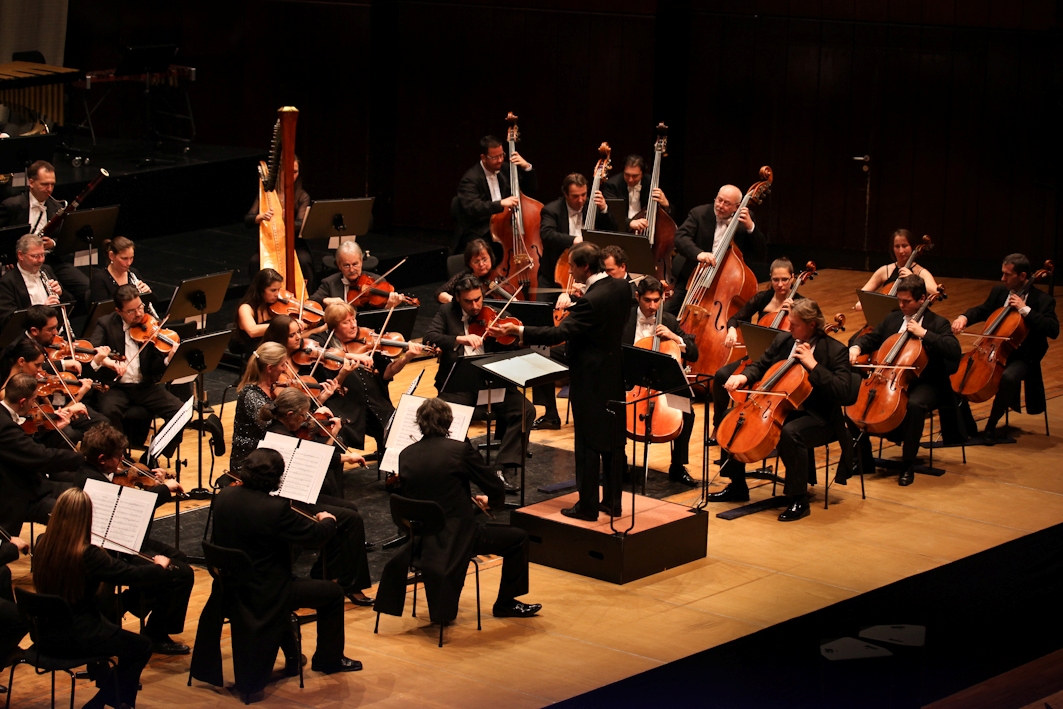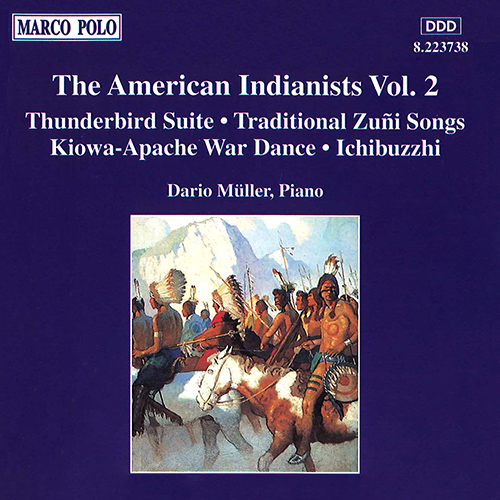Currently not available on CD.
AMERICAN INDIANISTS, Vol. 2
Kenneth MacMillan
ANASTASIA
Grand Duchess Anastasia/Anna Anderson - Natalia Osipova
Mathilde Kschessinska - Marianela Nuñez
Her partner - Federico Bonelli
Anna Anderson’s husband - Edward Watson
Rasputin - Thiago Soares
Tsarina Alexandra Feodorovna - Christina Arestis
Tsar Nicholas II - Christopher Saunders
Royal Opera House Orchestra
Simon Hewett, conductor
Kenneth MacMillan, choreographer
Fritz Winckel and Rüdiger Rüfer, electronic music
Bob Crowley, set and costume designer
John B. Read, lighting designer
Music:
Pyotr Il’yich Tchaikovsky
Bohuslav Martinů
Recorded live from the Royal Opera House, 2016
Bonus:
- Introduction to Anastasia
- The sets of Anastasia with Bob Crowley
- Darcey Bussell interviews Viviana Durante
Picture format: NTSC 16:9 anamorphic
Sound format: LPCM 2.0 / DTS 5.1
Region code: 0 (worldwide)
Running time: 113 mins (ballet) + 14 mins (bonus)
No. of DVDs: 1 (DVD 9)
The Failoni Chamber Orchestra of the Hungarian State Opera was founded in 1989 by young soloists of the Hungarian State Opera Orchestra. Their name reflects their admiration of this great Italian conductor, Sergio Failoni.
Béla Nagy has been the concertmaster from the beginning. He was awarded the Gold Cross of Merit of the Republic of Hungary in 2006. In its concerts and recordings the orchestra has worked together with famous singers and conductors, including Plácido Domingo, José Cura, Andrea Bocelli, Julia Hamari, Katia Ricciarelli, Edita Grube, Roberto Servile, Kurt Rydl, Ramon Vargas, Yuri Simonov, Rico Saccani, Will Humburg, Michael Halász, János Ács, Hanspeter Gmür, Pier Giorgio Morandi, Thanassis Polykandriotis and Ennio Morricone.
The orchestra has a close working relationship with Naxos and has produced more than 20 recordings, of which two received the CD of the Year Award in BBC Music Magazine.


Uwe Grodd, New Zealand based German conductor and flautist, has performed and recorded internationally for over 25 years.
Uwe Grodd first gained worldwide recognition when he won First Prize at the Cannes Classical Awards 2000, for the ‘Best 18th Century Orchestral Recording’ with his CD of Symphonies by Johann Baptist Vaňhal conducting the Nicolaus Esterházy Sinfonia in Hungary. This was followed by a recording of Ignaz Pleyel’s Symphonies with the Capella Istropolitana from Slovakia. In 2002, this CD was one of three finalists in the Best 18th & 19th Century Orchestral Recording category at Cannes. It also reached the Critics’ Choice TOP 60 Discs of the recording year in the BBC Music Magazine.
His world première recording of the Missa Solemnis, by J.N. Hummel, with the New Zealand Symphony Orchestra and Tower Voices NZ, was voted Editor’s Choice by Gramophone magazine in May 2004.
2006–08 was a very creative and exciting season for Uwe. In less than two years and across four countries, he has produced seven different recordings for Naxos Records: four CDs as a conductor and three as a flautist, performing his own editions of quartets for flute and strings by Johann Baptist Vaňhal and a disc of flute music by Schubert which was released in January 2009. In addition to the many concerts and recordings Uwe was invited to take up the position as Music Director in July 2008 of New Zealand’s longest established choir, the Auckland Choral Society.
This period also marks the halfway point on the journey towards the complete recordings of the works for piano and orchestra by Beethoven’s longstanding friend and student, Ferdinand Ries. Uwe conducted volume three with the Royal Liverpool Philharmonic Orchestra and volume four with the Bournemouth Symphony in June 2008 including a remarkable set of variations to ‘Rule Britannia’ for piano and orchestra.
Following the success of Ries’ Volume One, the second in this series of world première recordings was made in Sweden with the Gävle Symphony Orchestra and the same team of Grodd and Hinterhuber, which includes ‘Swedish National Airs and Variations’.
“Hinterhuber and Grodd are the ideal team for Ries’ (1784–1838) music…What an exciting start to this series!” Piano News (February 2006).
Uwe has made other interesting discoveries: previously unheard music by Johann Nepomuk Hummel and, in September 2006, music by the ‘Swedish Mozart’, Joseph Martin Kraus. Uwe Grodd and Takako Nishizaki, with the New Zealand Symphony Orchestra, recorded his violin concerto as well as the orchestral ballet score to Azire and the Incidental Music for Olympie.
Performance highlights in recent years include the final concerts of the 53rd and the 54th Handel Festival in Halle, Germany. This prestigious event—a televised open-air concert—involves a combined choir of 280 and the State Philharmonic Orchestra. The previous year Uwe conducted the gala opening night of the Halle Handel Festival with Le Choeur des Musiciens du Louvre from Grenoble, a number of front-line soloists and the Halle Opera Orchestra performing on original instruments. This was followed, in 2003 and 2004, by a highly successful season in the Halle Opera House of Handel’s recently re-discovered opera, Imeneo. The season marked the launch of a new performing edition, by Bärenreiter, the foremost European publishing house. The reputable German opera magazine, Opernwelt, nominated the performances as the ‘Rediscovery of the Year 2003’.
Uwe made his Mexican debut in March 2004, with the Mexico City Philharmonic, conducting Beethoven’s 1st Symphony, Liszt’s Mazeppa and Dvořák’s Czech Suite. This was followed by an immediate return invitation in June to conduct Bruckner’s Fourth and Mozart’s ‘Elvira Madigan’ Concerto. Subsequently, Uwe conducted a further eight concerts which included Ein Heldenleben by Richard Strauss, Beethoven’s and Schubert’s Fifth Symphonies and Haydn’s Sinfonia Concertante.
Other highlights have included the opening concerts of the Thüringen Philharmonic’s 2005/2006 season, in Gotha and Suhl, Germany, performing Schumann, Beethoven and Tchaikovsky. In the same month he appeared in the Auckland Town Hall, New Zealand, performing, with the Auckland University Symphony Orchestra, a programme entitled ‘Landscapes’, that included Copland’s Appalachian Spring, Douglas Lilburn’s Songs of Islands and Tchaikovsky’s symphony Winter Daydreams.
From 1998 until 2002, Uwe was Artistic Director of the International Music Festival New Zealand and has been conductor and Music Director of the Auckland University Symphony Orchestra from 1989–2004. In 1989, before an audience of 250,000, he appeared in Symphony Under the Stars with the Auckland Philharmonia.
In 1993 he was appointed Music Director of the Manukau Symphony Orchestra. In 2005, for the opening celebration of the new concert hall—the Genesis Energy Theatre—in Manukau City, a ceremony led by New Zealand’s Prime Minister, he combined five choirs with the MSO in a special project named "The Genesis". It included a world première for choir and orchestra, The Journey, written especially for Uwe Grodd and the MSO by Leonie Holmes.
An avid supporter of contemporary music of all genres, Uwe has been central to numerous commissions and given many first performances including, in 2002, conducting the premier season of the multi-media opera Galileo, with music by John Rimmer and libretto by Witi Ihimaera.
Uwe Grodd is the Founder and Artistic Director of the Flute Fest New Zealand (2001–2004), and an Associate Professor of Conducting and Flute at the University of Auckland. His reputation as an inspiring teacher is well documented by his students’ international performances and prizes. His editions of music by Vaňhal, Beethoven and Ries, published by Artaria Editions, are increasingly in demand.
A graduate of Mainz University, Germany, Uwe Grodd studied with teachers of international repute, including Manfred Schreier, André Jaunet and Werner Peschke. He attributes his major musical growth to the guidance of two of Europe’s finest musicians: Robert Aitken and Maestro Sergiu Celibidache.
For Uwe Grodd, conducting, a solo career, chamber music, teaching and music editing are complementary disciplines. Every aspect of music-making, each musical engagement, every activity makes a vital contribution to the development of the whole musician; and to the fascinating complexity of musical interpretation, that magical process of discovery that is a distillation of rigour and imaginative intuition. Uwe remarks: ‘And during the 18th century one would also have composed, and even made one’s own instruments! I hope that you will find my many different activities on these web pages stimulating and interesting.’
For more information, visit uwegrodd.com.

Dittersdorf had composition lessons from Giuseppe Bonno in his native Vienna and served as a violinist in the orchestra of the Prince of Sachsen-Hildburghausen, before joining the imperial theatre. He then served as Kapellmeister to the Bishop of Grosswardein, where, in 1762, he succeeded Michael Haydn. In 1769 he became Kapellmeister to the Prince-Bishop of Breslau, at this period acquiring the patent of nobility that added to the name of Ditters the honorific ‘von Dittersdorf’. Conditions in Johannisberg, the seat of the Prince-Bishop, deteriorated in the political circumstances of the time, and on the death of his employer in 1795 he moved with his family to join the household of a nobleman in Bohemia. Before his death he dictated his fascinating autobiography to his son, a vivid account of musical life in his time.
Stage Works
Dittersdorf wrote a large number of stage works. The earlier Italian works written for Johannisberg were followed by a series of Singspiel primarily for Vienna, and 11 further such works in 1793 and 1794 for Duke Friedrich-August of Brunswick-Oels. These, all in all, mark an important stage in the development of the form.
Vocal and Choral Music
Dittersdorf made his due contribution to oratorio in four such works. He wrote settings of the Mass and other liturgical works, as well as cantatas and arias for church use. His secular vocal works are few.
Orchestral Music
In orchestral music Dittersdorf may be compared in some respects to his near contemporary Joseph Haydn. His 120 listed symphonies include a set of six giving musical expression to the Metamorphoses of Ovid and another nel gusto di 5 nazioni (‘in the taste of five nations’). His concertos, rather fewer in number, include 18 for violin, five for viola, one for cello and one for double bass, as well as a Double Concerto for viola and double bass.
Chamber Music
The chamber music of Dittersdorf, with all the clarity of Classical style, includes string quartets and quintets, divertimenti, and compositions for groups of wind instruments.































